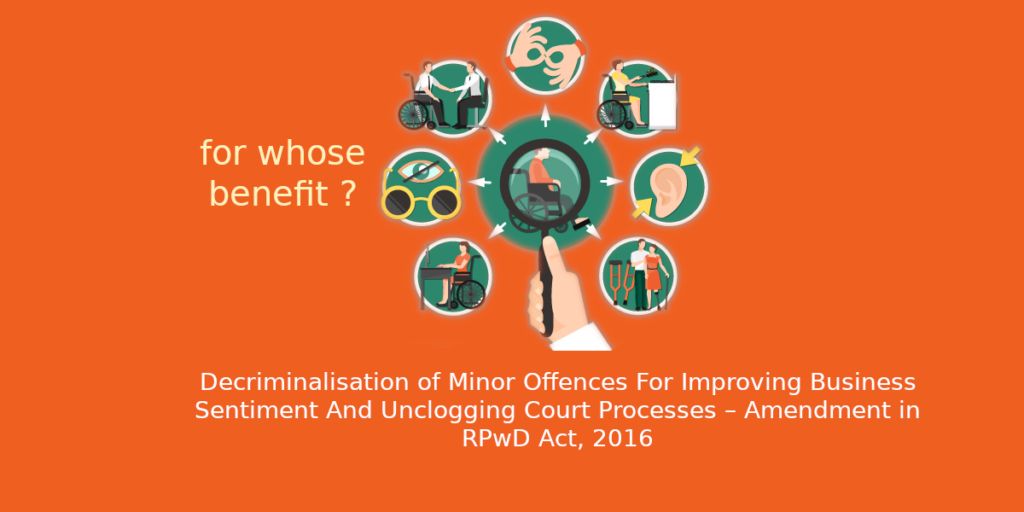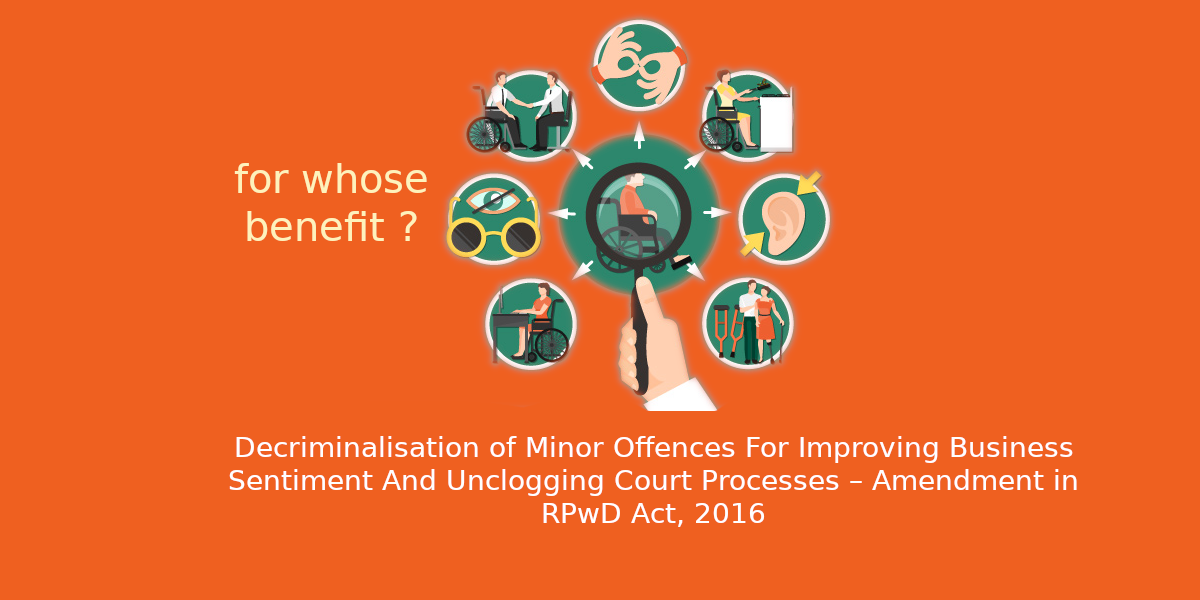
Decriminalisation of minor offences is one of the thrust areas of the Government. The risk of imprisonment for actions or omissions that aren’t necessarily fraudulent or the outcome of malafide intent is a big hurdle in attracting investments. The ensuing uncertainty in legal processes and the time taken for resolution in the courts hurts ease of doing business. Criminal penalties including imprisonment for minor offences act as deterrents, and this is perceived as one of the major reasons impacting business sentiment and hindering investments both from domestic and foreign investors. This becomes even more pertinent in the post COVID19 response strategy to help revive the economic growth and improve the justice system.
Given the nature of pendency in all tiers of the courts and the time taken for disputes to be resolved, legislative measures have been considered to help restore trust in doing business. In this pursuit, it is also important that a balance be found so that malafide intent is punished while other less serious offences are compounded. Accordingly, a framework is required such that a penalty levied is sufficient to act as a deterrent. Actions taken for decriminalisation of minor offences are expected to go a long way in improving ease of doing business and helping unclog the court system and prisons. It would also be a significant step in the Government of India’s objective of achieving ‘Sabka Saath, Sabka Vikas and Sabka Vishwas’.
Given the importance of this exercise as also its large-scale impact across society, Government of India is conducting a stakeholder consultation exercise. In order to develop consensus, the Ministry of Social Justice and Empowerment, Department of Empowerment of Persons with Disabilities, which administers Rights of Persons with Disabilities Act invites the comments of State Governments/ UT Administrations, Civil Society/ Non-Government Organisations, Academicians, Public and Private Sector organisations, Multilateral Institutions and members of the public to submit their comments on the proposed amendments indicated in Annexure I .
Stakeholders may submit their suggestions in the format as per Annexure II by mail at jsda-msje@nic.in or kvs.rao13@nic.in by 10th July 2020.
Proposed Amendments:
Provision – Section 89
Any person who contravenes any of the provisions of this Act, or of any rule made thereunder shall for first contravention be punishable with fine which may extend to ten thousand rupees and for any subsequent contravention with fine which shall not be less than fifty thousand rupees but which may extend to five lakh rupees.
Current Punishment
Upto ten thousand rupees for first contravention and for any subsequent contravention not less than fifty thousand Rupees but may extend to five lakh rupees.
Proposed Amendments
A New Section 95A may be inserted namely,- 95A.
- any offence under Section 89, 92(a) and 93, may, either before or after the institution of proceedings, be compounded by the Chief Commissioner for Persons with Disabilities or the State Commissioner for Persons with Disabilities, as the case may be, with the consent of the aggrieved person with disability, by such amount and in such manner as the Central Government may, by notification, specify in this behalf.
- Where an offence has been compounded under sub-sections (1), the offender, if in custody, shall be discharged and any proceeding in respect of such offence, shall be dropped.
Rationale for de-criminalization
With a view to ensure implementation of the RPwD Act, 2016 as well as providing mechanism for speedy discharge of cases for minor violation without involving serious offence, the provision is proposed to be introduced.
Provision – Section 92
Section 92 – Whoever,- (a) intentionally insults or intimidates with intent to humiliate a person with disability in any place within public view;
Current Punishment
Punishable with imprisonment for a term which shall not be less than six months but which may extend to five years and with fine.
Proposed Amendments
A New Section 95A may be inserted namely,- 95A.
- any offence under Section 89, 92(a) and 93, may, either before or after the institution of proceedings, be compounded by the Chief Commissioner for Persons with Disabilities or the State Commissioner for Persons with Disabilities, as the case may be, with the consent of the aggrieved person with disability, by such amount and in such manner as the Central Government may, by notification, specify in this behalf.
- Where an offence has been compounded under sub-sections (1), the offender, if in custody, shall be discharged and any proceeding in respect of such offence, shall be dropped.
Rationale for de-criminalization
With a view to ensure implementation of the RPwD Act, 2016 as well as providing mechanism for speedy discharge of cases for minor violation without involving serious offence, the provision is proposed to be introduced.
Provision – Section 93
Whoever, fails to produce any book, account or other documents or to furnish any statement, information or particulars which, under this Act or any order, or direction made or given thereunder, is duty bound to produce or furnish or to answer any question put in pursuance of the provisions of this Act or of any order, or direction made or given thereunder, shall be punishable with fine which may extend to twenty-five thousand rupees in respect of each offence, and in case of continued failure or refusal, with further fine which may extend to one thousand rupees for each day, of continued failure or refusal after the date of original order imposing punishment of fine.
Current Punishment
Punishable with fine which may extend to twenty-five thousand rupees in respect of each offence, and in case of continued failure or refusal, with further fine which may extend to one thousand rupees for each day, of continued failure or refusal after the date of original order imposing punishment of fine.
Proposed Amendments
A New Section 95A may be inserted namely,- 95A.
- any offence under Section 89, 92(a) and 93, may, either before or after the institution of proceedings, be compounded by the Chief Commissioner for Persons with Disabilities or the State Commissioner for Persons with Disabilities, as the case may be, with the consent of the aggrieved person with disability, by such amount and in such manner as the Central Government may, by notification, specify in this behalf.
- Where an offence has been compounded under sub-sections (1), the offender, if in custody, shall be discharged and any proceeding in respect of such offence, shall be dropped.

We oppose